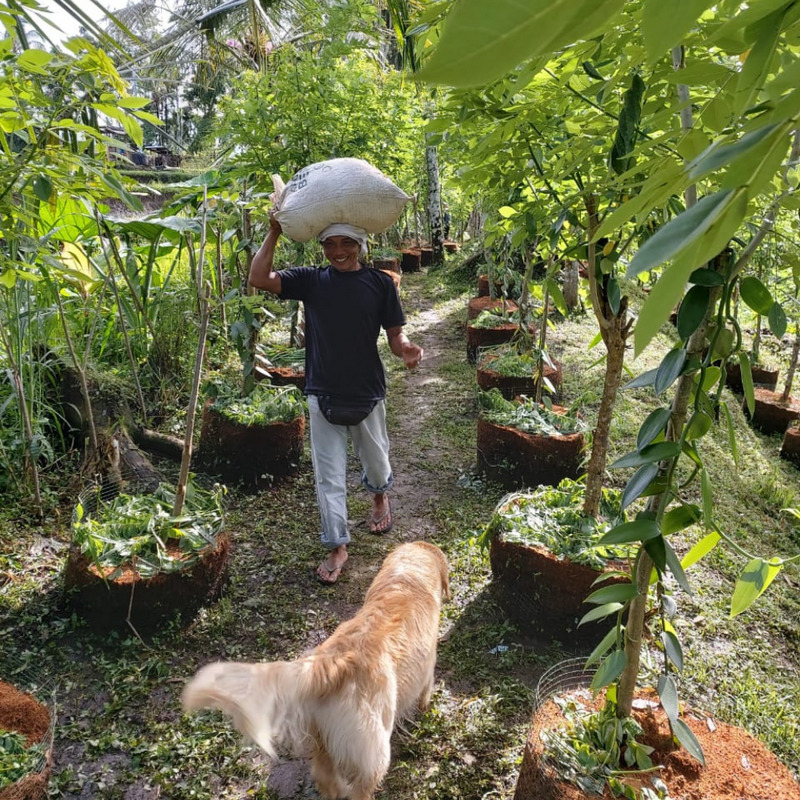
April was a month of consolidation for Royal Spice Gardens, with the added bonus of saying goodbye to the worst of the rainy season at long last. Six months! It confused the vanilla, some of which is now trying to flower.
Despite the fact that we have not made any profit and might not for another two years or more, we still have taxes to pay on wages, land leases and professional services, withholding that tax for the tax office. Naturally, we are obliged to report exactly what we are up to. Taxes have been paid and we are awaiting confirmation that we are compliant with Indonesian tax law. By making necessary efforts to ensure compliance we are setting an example; expected of every company, but especially important for a Royal one.
The website is being renovated and is more in-line with our purpose. The previous iteration had been centred to snaring investors. Now, it is more representing of us and the multifaceted approach RSG brings. A new version of the prospectus is also being finalised. These could both be live in May.
On the plantations front, I visited farmers in Pupuan, Tabanan province, who are keen to work with us. However, the visit gave me pause for thought and I am reevaluating the best way to work with them. While Pupuan is lovely and ideal for vanilla, we have no connections there and the gardens would not have the same level of protection we have built up over several years in Bangli and Tampaksiring.
Rather than request free land as a price of working with us (or running a joint venture), we think it will be better to bring farmers to us to learn and then have a sales arrangement with them so they grow the vanilla on our behalf. The farmers remain responsible for security so much lower risk and no capital investment for RSG. It also makes us more attractive to Associate Farmers thus more farmers should want onboard, bringing a much greater volume of, albeit, reduced profits. It makes sense.
Garden 14 is complete with shade trees now growing that will be ready for vanilla cuttings to be planted in another couple of months, when the shade is sufficient. In Garden 10’s shade house we are creating a new nursery and have 500 young plants in pots.
Garden 5 was originally planted under the landowners cash crop timber trees. At first, we thought this a good idea however, the vanilla is thin and slow to grow and we have had to conclude that there is too much shade. This is further evidence that vanilla likes a lot of light, just not direct sunlight.
The landowner has agreed to harvest his trees early, so we are able to reconfigure Garden 5 and we are expecting to see improved growth in the immediate future. We will also be able to switch from caged bedded trees to raised beds, which are outperforming caged trees - a caged tree is one with wire around the trunk filled with cocopeat. The tree felling caused some damage to our vanilla vines below nevertheless, we are using these for cuttings, so it helps with our reconfiguration of Garden 5.
Garden 4, our oldest raised bed, has had magnificent growth of vanilla, which will start to flower shortly.
The land for Garden 15 has been identified and terms agreed with the landowner, a former Village Head from our Tampaksiring operation. The exciting thing about this land is that it isn’t marginal land, but actual rice fields. With more light for us to control we should get better vanilla and an opportunity to prove to farmers that there are environment-friendly alternatives to rice.
Dadap has done a deal with an optician, who is also an investor in us, to check all our staff. Vision is vital for a vanilla farmer. Without it, you cannot pollinate. The optician will provide glasses to those who need it. Personally, I have to take my glasses off to see enough to pollinate. In the next few months, we expect to see thousands of flowers, which need hand pollinating before 9am. This means we will need lots of people with good vision!
We are still looking to meet with the professor at Saraswati University who is a vanilla expert. He caught Covid when we were due to meet and now he is recovered the meeting can be reconvened. We are interested in working closely, perhaps using university laboratory facilities and funding a PhD.
Our own factory is moving closer. We are considering three sites. One on the by-pass, one an ex-restaurant in Tampaksiring and one, a greenfield site, nearer to the gardens. All have their advantages, but first we must confirm the funding.
No progress on other crops, except we have identified another, porang, which is a root that produces a gluten free flour and is in demand in Korea. This grows well alongside vanilla.
Royal Spice Gardens is an Indonesian Foreign Investment Company, in Indonesia known as a Perusahaan Modal Asing (PMA).
NIB Licence number 0220100502286. NPWP: 94.830.504.0- 905.000.
PT Royal Spice Gardens Indonesia, Jl. Raya Pejeng, Tampaksiring, Gianyar, Bali 80552, Indonesia
Website by Simia Solutions / Cre8 Design Studio
Powered by Pak Kriss’s Compliance Framework.
Even in uncertain times, credible, stable & realistic opportunities are available for the astute investor.
Get the edge by obtaining clear, concise and rapid information. Fill out the form to receive our latest prospectus!